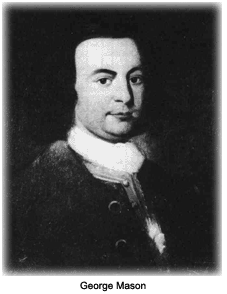George Mason was never a holder of high office, but he was one of the most consistent voices for the protection of American rights during the Revolutionary generation. He was born on December 11, 1725, in Fairfax County, Virginia, and after the death of his father, was taken in by an uncle, John Mercer. Mason was educated privately and profited greatly from the titles in his uncle’s renowned library.
 As a young adult, Mason assumed control of Gunston Hall, one of the most magnificent residences in an area of grand homes. The plantation was known for its tobacco and orchards. George Washington was a neighbor and fellow investor in the Ohio Company. When that venture's speculative activities were ended later by the Crown, Mason took a radical turn in his thinking.
As a young adult, Mason assumed control of Gunston Hall, one of the most magnificent residences in an area of grand homes. The plantation was known for its tobacco and orchards. George Washington was a neighbor and fellow investor in the Ohio Company. When that venture's speculative activities were ended later by the Crown, Mason took a radical turn in his thinking.
In the 1750s, Mason began a career in local public service. He was selected as a trustee of the town of Alexandria, a justice in the Fairfax County court system, and a vestryman of Truro parish.
In 1759, Mason was elected to the Virginia House of Burgesses, where he became an ardent critic of many British programs. In 1766, during the Stamp Act crisis, he attempted to marshal economic pressure on Parliament by writing a letter to British merchants in an attempt to enlist their opposition to the stamp tax.
Three years later, Mason drafted the Virginia nonimportation agreement that followed the enactment of the Townshend Acts. In 1774, after Parliament had targeted Massachusetts with the Coercive Acts, Mason worked with Washington to summarize the constitutional case against the recent legislation in the Fairfax Resolves.
Mason served as a delegate to the Virginia Convention in 1775 and supported the decision to arm the commonwealth for a possible war. The following year, he served in the Virginia Constitutional Convention, where he made major contributions to the writing of a new governing document and drafted the Virginia Declaration of Rights, a statement of the inalienable rights of the colonists. His ideas, and some of his wording, were soon adopted by Thomas Jefferson in the Declaration of Independence and by the states in their own bills of rights.
During the War of Independence, Mason played an organizational role in defending his state, but did not see service. He also worked for the disestablishment of the Anglican Church.
In postwar Virginia, Mason urged the cession of western land claims, a view that was not shared by speculators and the frontier population. Acting somewhat out of character, Mason agreed to attend the Constitutional Convention in Philadelphia in 1787, his concern for the wellbeing of the nation outweighing his inclination to stay at home. He was a major participant in the proceedings, but was deeply disappointed in the result. His criticisms of the final document included:
Mason was one of three delegates at the convention who refused to sign the document. He took his opposition back to Virginia, where he teamed with Patrick Henry and other Anti-Federalists in an unsuccessful attempt to defeat ratification. He published his criticisms in a newspaper essay that was intended to counter the arguments presented in The Federalist Papers. His campaign against the Constitution (text) cost him his friendship with Washington.
Mason later turned down a U.S. Senate seat from the Virginia legislature, but experienced the great satisfaction of seeing the adoption of the Bill of Rights in 1791. Those 10 amendments, along with Amendment XI that limited judicial power, were modeled after his Declaration of Rights. James Madison, a close friend and confidant, was a driving force behind this victory in the first session of the new Congress.
George Mason was one of the Founding Fathers whose name is not widely recognized today. His lack of interest in elective office and contempt for long-winded political proceedings cost him lasting fame. His contemporaries, however, understood the depth of his contribution. Jefferson labeled him the "wisest man of his generation." He died at Gunston Hall on October 7, 1792.